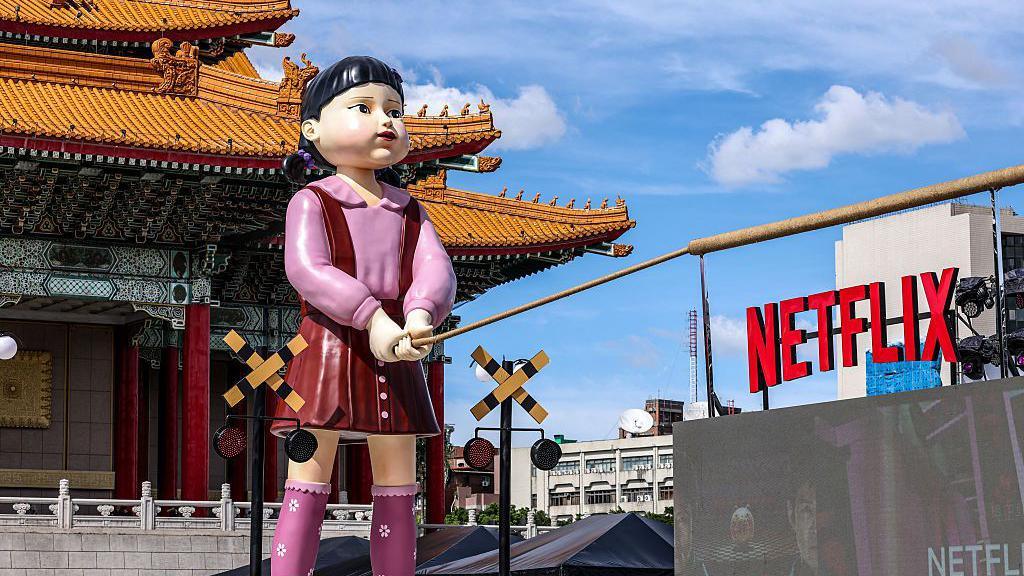Warning: This article contains spoilers.
Millions of viewers are bidding farewell to *Squid Game*, the Emmy Award-winning television series that has dominated Netflix charts and become emblematic of South Korea’s burgeoning influence in Hollywood.
The fictional drama centers on contestants burdened by debt who compete in a series of traditional Korean children’s games, each round carrying a deadly consequence for the losers.
Since its debut in 2021, *Squid Game* has captivated audiences with its vibrant set designs and stark commentary on capitalism and human nature. With the release of its third and final season last Friday, fans globally are returning to reality after the series’ conclusion.
The dystopian narrative has prompted some South Koreans to reflect on the societal conditions that inspired the series.
One YouTube comment under a clip from season three reads: “I feel like *Squid Game 3* revealed the true feelings and raw inner thoughts of Korean people.”
“It reflected reality so well, like how in real life, at work, it’s just full of ruthless people ready to crush you. This show nailed it.”
*Squid Game* emerged from a backdrop of intense competition and widening inequality within South Korean society —where people are under significant stress regarding childbearing and a university entrance exam is perceived as a defining moment in one’s life.
The show’s diverse characters—including a white-collar worker, a migrant factory employee, and a cryptocurrency scammer—are representative of figures familiar to many South Koreans.
The backstory of protagonist Seong Gi-hun, a former car factory worker who was laid off and later participated in a strike, draws inspiration from the 2009 SsangYong Motor factory strike, a major labor dispute where workers clashed with riot police over mass layoffs.
“The drama may be fictional, but it feels more realistic than reality itself,” Jeong Cheol Sang, a film enthusiast, wrote in his review of *Squid Game’s* final season.
“Precarious labor, youth unemployment, broken families—these aren’t just plot devices, but the very struggles we face every day.”
Those darker messages seemed to be brushed to the side on Saturday night, as a massive parade celebrated the release of the blockbuster’s final season. A giant killer doll and dozens of faceless guards in tracksuits – among other motifs of the deadly games – marched down central Seoul to much fanfare.
For South Korea’s leaders, *Squid Game* has become a symbol of K-drama’s success on the global stage. It is also part of a string of successes – along with K-pop act BTS and Oscar-winning film Parasite – on which newly elected president Lee Jae Myung wants to capitalise as he sets his sights on exporting K-culture far and wide.
There are signs the *Squid Game* hype may even go further: the show’s final scene, where Cate Blanchett plays a Korean game with a man in a Los Angeles alley, has fuelled rumors of an American spinoff.
The series ended on an “open-ended” note, Lee Jung-jae, the star of the series, told the BBC. “So it poses a lot of questions to the audience. I hope people will talk about those questions, ponder upon themselves about the questions and try to find an answer.”
In the show’s later seasons, viewers follow Gi-hun’s quest to bring down the eponymous games, which are packaged as entertainment for a group of wealthy VIPs.
But his rebellion fails, and by the end Gi-hun is forced to sacrifice himself to save another player’s baby – an ending that has polarised viewers.
Some argued that Gi-hun’s actions did not square with the dark portrait of reality that showrunners had developed – one that had so well captured the ruthless elements of human nature.
“The characters’ excessive altruism was disturbing – almost to the point of seeming unhinged,” reads a comment on popular South Korean discussion site Nate Pann. “It felt like a fake, performative kind of kindness, prioritising strangers over their own families for no real reason.”
But others said Gi-hun’s death was in line with the show’s commitment to uncomfortable truths.
“This perfectly describes humanity and the message of the show,” another commented on YouTube.
“As much as we wanted to see Gi-Hun win, kill the frontman and the VIPs, and stop the games once and for all before riding off into the sunset, that’s just not the world we live in and it’s certainly not the one that Gi-Hun lived in.”
Hwang Dong-hyuk, the show’s creator, told reporters on Monday that he understood the “mixed reaction” to the final season.
“In season one there were no expectations, so the shock and freshness worked. But by seasons two and three, expectations were sky high, and that makes all the difference,” Hwang said on Monday.
“Game fans wanted more games, others wanted deeper messages, and some were more invested in the characters. Everyone expected something different.”
For some, at least, Gi-hun’s final choice offered a hopeful reflection of reality: that even in times of adversity, kindness can prevail.
“That paradox—of cruelty and warmth coexisting—is what made the finale so moving,” said Mr Jeong, the film blogger. “Watching the *Squid Game* made me reflect on myself. As someone who has worked in education and counselling, I’ve questioned whether kindness can really change anything.”
“That’s why I stayed with this story. That’s why I call this ending beautiful.”
Paetongtarn Shinawatra has been suspended as the constitutional court considers a petition for her removal.
A hiker who filmed the infestation told local media the bugs at Gyeyangsan mountain were like a “thick carpet”.
Newly-elected mayor Francisco Domagoso has advised residents to refrain from taking out their rubbish.
The Uttar Pradesh government says 37 people were killed in the Kumbh Mela crush, but the BBC has verified at least 82 deaths.
Protests broke out across the country after footage of the incident was circulated.

